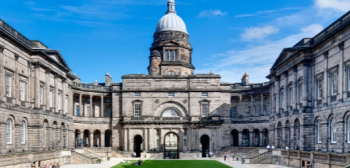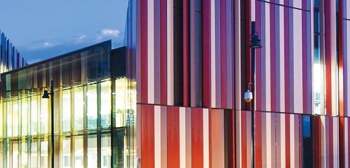- #53 QS Global World Ranking
- PublicStatus
- Very HighResearch Output
- 10,951Total Students
- 1,399Faculty
- 1,048Int'l Students
QS Global World Ranking
The University’s position in the current QS World University Rankings.
The University’s position in the current QS World University Rankings.
Status
Whether the University is funded by the government of that country or state, or funded by private donations.
Whether the University is funded by the government of that country or state, or funded by private donations.
Research Output
The research intensity of the University, based on the number of papers output relative to the University’s size.
The research intensity of the University, based on the number of papers output relative to the University’s size.
Total Students
The number of full time equivalent students enrolled at the University.
The number of full time equivalent students enrolled at the University.
Faculty
The number of full time equivalent teaching staff employed by the University.
The number of full time equivalent teaching staff employed by the University.
Int'l Students
The number of full time equivalent international students enrolled at the University.
The number of full time equivalent international students enrolled at the University.
KAIST - Korea Advanced Institute of Science & Technology
About
Read more
Read less
Formerly known as the Korea Advanced Institute of Science and Technology, KAIST was South Korea’s first research-oriented science and engineering institution when it was founded in 1971.
For such as young university, KAIST’s standing is growing rapidly: it is widely acknowledged as the best university in Korea and has been named the most innovative university in the Asia-Pacific region.
One of its stand-out research projects of recent years saw researchers develop an electric transport system, where vehicles get power from cables underneath the road via non-contact magnetic charging. It’s an example of how KAIST is leading the field in developing new technologies that might tackle world problems such as energy consumption and congestion in cities.
Around 10,000 full-time students attend KAIST, split between 4,000 undergraduates and 6,000 postgraduates. Science, engineering and technology are the school’s main focuses, though the university has branched out in recent years and is now internationally accredited in business education too. It has also adopted dual degree programs with leading world universities such as Carnegie Mellon in the United States and the Technical University of Berlin, and these offer its students diverse educational opportunities.
The university’s main campus is in Daedeok Science Town in the city of Daejeon, 150 kilometers south of the South Korean capital, Seoul. There’s also another campus in Seoul itself, which is home to the business school as well as the graduate schools of finance, management and information and media management.
Most lectures and research activities take place on the Daejeon main campus, which is also where most students live. There is a total of 29 dormitories on the outskirts of the Daedeok campus, strictly segregated along gender lines. There are also apartments for married students outside the campus. Extracurricular activities on campus may not be a priority at KAIST, although there are clubs and societies for students, and the university holds regular arts events including opera, drama, pop concerts, dance and classical recitals.
For such as young university, KAIST’s standing is growing rapidly: it is widely acknowledged as the best university in Korea and has been named the most innovative university in the Asia-Pacific region.
One of its stand-out research projects of recent years saw researchers develop an electric transport system, where vehicles get power from cables underneath the road via non-contact magnetic charging. It’s an example of how KAIST is leading the field in developing new technologies that might tackle world problems such as energy consumption and congestion in cities.
Around 10,000 full-time students attend KAIST, split between 4,000 undergraduates and 6,000 postgraduates. Science, engineering and technology are the school’s main focuses, though the university has branched out in recent years and is now internationally accredited in business education too. It has also adopted dual degree programs with leading world universities such as Carnegie Mellon in the United States and the Technical University of Berlin, and these offer its students diverse educational opportunities.
The university’s main campus is in Daedeok Science Town in the city of Daejeon, 150 kilometers south of the South Korean capital, Seoul. There’s also another campus in Seoul itself, which is home to the business school as well as the graduate schools of finance, management and information and media management.
Most lectures and research activities take place on the Daejeon main campus, which is also where most students live. There is a total of 29 dormitories on the outskirts of the Daedeok campus, strictly segregated along gender lines. There are also apartments for married students outside the campus. Extracurricular activities on campus may not be a priority at KAIST, although there are clubs and societies for students, and the university holds regular arts events including opera, drama, pop concerts, dance and classical recitals.
About
Formerly known as the Korea Advanced Institute of Science and Technology, KAIST was South Korea’s first research-oriented science and engineering institution when it was founded in 1971.
For such as young university, KAIST’s standing is growing rapidly: it is widely acknowledged as the best university in Korea and has been named the most innovative university in the Asia-Pacific region.
One of its stand-out research projects of recent years saw researchers develop an electric transport system, where vehicles get power from cables underneath the road via non-contact magnetic charging. It’s an example of how KAIST is leading the field in developing new technologies that might tackle world problems such as energy consumption and congestion in cities.
Around 10,000 full-time students attend KAIST, split between 4,000 undergraduates and 6,000 postgraduates. Science, engineering and technology are the school’s main focuses, though the university has branched out in recent years and is now internationally accredited in business education too. It has also adopted dual degree programs with leading world universities such as Carnegie Mellon in the United States and the Technical University of Berlin, and these offer its students diverse educational opportunities.
The university’s main campus is in Daedeok Science Town in the city of Daejeon, 150 kilometers south of the South Korean capital, Seoul. There’s also another campus in Seoul itself, which is home to the business school as well as the graduate schools of finance, management and information and media management.
Most lectures and research activities take place on the Daejeon main campus, which is also where most students live. There is a total of 29 dormitories on the outskirts of the Daedeok campus, strictly segregated along gender lines. There are also apartments for married students outside the campus. Extracurricular activities on campus may not be a priority at KAIST, although there are clubs and societies for students, and the university holds regular arts events including opera, drama, pop concerts, dance and classical recitals.
For such as young university, KAIST’s standing is growing rapidly: it is widely acknowledged as the best university in Korea and has been named the most innovative university in the Asia-Pacific region.
One of its stand-out research projects of recent years saw researchers develop an electric transport system, where vehicles get power from cables underneath the road via non-contact magnetic charging. It’s an example of how KAIST is leading the field in developing new technologies that might tackle world problems such as energy consumption and congestion in cities.
Around 10,000 full-time students attend KAIST, split between 4,000 undergraduates and 6,000 postgraduates. Science, engineering and technology are the school’s main focuses, though the university has branched out in recent years and is now internationally accredited in business education too. It has also adopted dual degree programs with leading world universities such as Carnegie Mellon in the United States and the Technical University of Berlin, and these offer its students diverse educational opportunities.
The university’s main campus is in Daedeok Science Town in the city of Daejeon, 150 kilometers south of the South Korean capital, Seoul. There’s also another campus in Seoul itself, which is home to the business school as well as the graduate schools of finance, management and information and media management.
Most lectures and research activities take place on the Daejeon main campus, which is also where most students live. There is a total of 29 dormitories on the outskirts of the Daedeok campus, strictly segregated along gender lines. There are also apartments for married students outside the campus. Extracurricular activities on campus may not be a priority at KAIST, although there are clubs and societies for students, and the university holds regular arts events including opera, drama, pop concerts, dance and classical recitals.
University highlights
- 2012#63
- 2014#60
- 2015#51
- 2016#43
- 2017#=46
- 2018#=41
- 2019#40
- 2020#41
- 2021#39
- 2022#41
- 2023#=42
- 2024#56
- 2025#53
QS Stars is a rating system that helps you select the right university based on your
interests. It provides a detailed look at an institution, identifying which universities rate highest in
the
specific topics that matter to you, like facilities, graduate employability, social responsibility,
inclusiveness, and more.
Campus locations
373-1, Guseong-dong, Daejeon, KR,
373-1 , Daejeon , South Korea , 305-701
291 Daehak-ro, Daejeon, KR,
291 Daehak-ro , Daejeon , South Korea , 305-701
373-1, Guseong-dong, Daejeon, KR,
373-1 , Daejeon , South Korea , 305-701
Similar Universities
The University of Sydney Business School
Economics and Business Building, Sydney
The University of Edinburgh
University of Edinburgh, Old College, Edinburgh
20 QS World University RankingsUniversidad Popular Autonoma del Estado de Puebla (UPAEP)
21 sur 1103 Barrio Santiago, Puebla
4 QS starsWestminster Business School | University of Westminster
University of Westminster, London
Al Imam Mohammad Ibn Saud Islamic University
Riyadh, Riyadh
Related content

World University Rankings –…
By
Sabrina
Collier
Updated
4.1k
0

The World's Top 100 Uni…
By
QS Staff
Writer
Updated
48.6k
14

Top Engineering Schools in 2…
By
Sabrina
Collier
Updated
808
1

Top 10 Universities in South…
By
Sabrina
Collier
Updated
659
0

Top Universities for Natural…
By
Sabrina
Collier
Updated
443
0

Top Universities for Physics…
By
Sabrina
Collier
Updated
946
0

Top Universities for Mathema…
By
Sabrina
Collier
Updated
266
0

Top 10 Universities in Asia…
By
Sabrina
Collier
Updated
394
0

Top 10 Universities in Asia…
By
Laura
T
Updated
322
0
Test preparations
Featured University


Sponsored
438
QS World University Rankings
-
10 UG & 47 PGTotal courses
-
Private for ProfitStatus
-
HighResearch output
KAIST - Korea Advanced Institute of Science & Technology
basic
8
no
1048
M
EN















